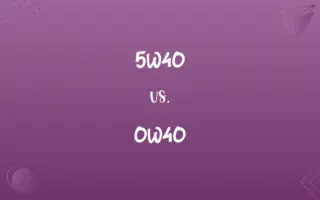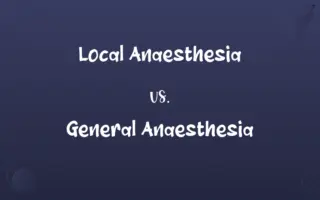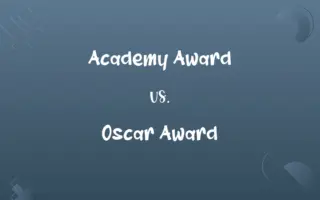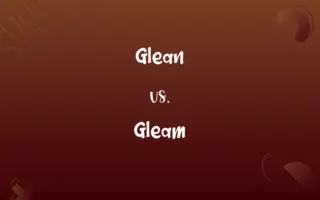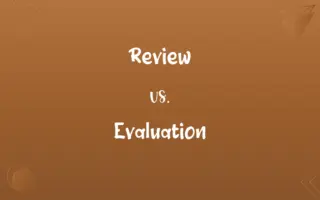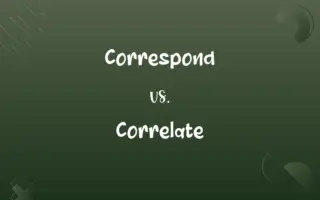Era vs. Fue: Know the Difference

By Shumaila Saeed || Published on February 1, 2024
An era refers to a significant period in history marked by distinctive characteristics, while fue, a Spanish term, translates to 'was' or 'were' in English, indicating past tense.
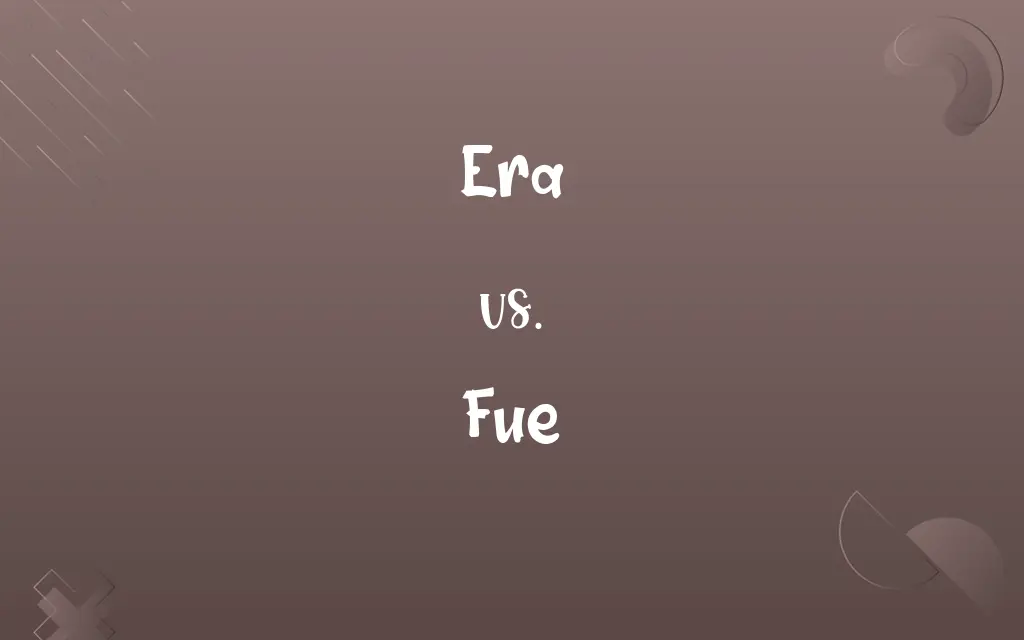
Key Differences
The word era signifies a long and distinct period in history, often associated with significant events, changes, or personalities. In contrast, fue, a conjugation of the Spanish verb 'ser' (to be), serves as a past tense marker, indicating that an action or state was true in the past. Both words, though different in languages and applications, relate to the concept of time.
Shumaila Saeed
Feb 01, 2024
Era is commonly used in historical and cultural contexts to denote periods like the Victorian era or the digital era, encapsulating specific characteristics of those times. Fue, used in Spanish, conveys past actions or states, like 'ella fue profesora' (she was a teacher). While era provides a temporal framework, fue denotes the completion or occurrence of a state or action in the past.
Shumaila Saeed
Feb 01, 2024
In literature and academic discussions, an era often demarcates significant shifts in thought, such as the Renaissance era. Fue, in Spanish narratives or conversations, is essential for describing past events or conditions, like 'fue un día soleado' (it was a sunny day). Both era and fue are crucial in their respective languages for discussing the progression of time and events.
Shumaila Saeed
Feb 01, 2024
The term era can span decades or even centuries, highlighting broad historical phases or technological advancements. Fue, being a verb form, is limited to describing specific instances or conditions that existed previously. Era provides a macro view of time, while fue focuses on particular past occurrences.
Shumaila Saeed
Feb 01, 2024
Era is often used metaphorically to describe significant phases in one's life or in various fields, such as 'the era of smartphones'. Fue, as a past tense verb, is more straightforward in its application, indicating what someone or something was at a previous time. Both terms, though different in scope and language, contribute to the articulation of temporal experiences.
Shumaila Saeed
Feb 01, 2024
ADVERTISEMENT
Comparison Chart
ADVERTISEMENT
Era and Fue Definitions
Fue
Used to describe past states.
El clima fue perfecto (The weather was perfect).
Shumaila Saeed
Jan 18, 2024
Era
A significant period in history.
The Renaissance era was a time of great artistic achievement.
Shumaila Saeed
Jan 18, 2024
Fue
Conveys past existence or identity.
Fue la primera vez (It was the first time).
Shumaila Saeed
Jan 18, 2024
ADVERTISEMENT
Era
A phase characterized by specific features.
The Jurassic era is well-known for its dinosaurs.
Shumaila Saeed
Jan 18, 2024
Era
A notable period in a particular field.
The steam engine marked a new era in transportation.
Shumaila Saeed
Jan 18, 2024
Fue
Indicates completed actions in the past.
Fue un éxito (It was a success).
Shumaila Saeed
Jan 18, 2024
Era
A period of time as reckoned from a specific date serving as the basis of its chronological system.
Shumaila Saeed
Jan 15, 2024
Era
A period of time characterized by particular circumstances, events, or personages
The Colonial era of US history.
The Reagan era.
Shumaila Saeed
Jan 15, 2024
Era
(geology) A geochronologic unit of tens to hundreds of millions of years; a subdivision of an eon, and subdivided into periods.
Shumaila Saeed
Jan 15, 2024
Era
A fixed point of time, usually an epoch, from which a series of years is reckoned.
The foundation of Solomon's temple is conjectured by Ideler to have been an era.
Shumaila Saeed
Jan 15, 2024
Era
A period of time reckoned from some particular date or epoch; a succession of years dating from some important event; as, the era of Alexander; the era of Christ, or the Christian era (see under Christian).
The first century of our era.
Shumaila Saeed
Jan 15, 2024
Era
A period of time in which a new order of things prevails; a signal stage of history; an epoch.
Painting may truly be said to have opened the new era of culture.
Shumaila Saeed
Jan 15, 2024
Era
A period marked by distinctive character or reckoned from a fixed point or event
Shumaila Saeed
Jan 15, 2024
Era
A major division of geological time; an era is usually divided into two or more periods
Shumaila Saeed
Jan 15, 2024
Repeatedly Asked Queries
What does fue mean in Spanish?
Fue is the past tense of the Spanish verb 'ser', meaning 'was' or 'were'.
Shumaila Saeed
Feb 01, 2024
What is an era?
An era is a significant period in history marked by distinct characteristics or events.
Shumaila Saeed
Feb 01, 2024
Can fue be used to indicate past actions?
Yes, fue is used to describe states or conditions that existed in the past.
Shumaila Saeed
Feb 01, 2024
Is fue used with regular verbs in Spanish?
Fue is specific to the irregular verb 'ser'; it's not used with regular verbs.
Shumaila Saeed
Feb 01, 2024
Can era be used in a personal context?
Yes, era can describe significant periods in a person's life or career.
Shumaila Saeed
Feb 01, 2024
Is fue used only in singular form?
Yes, fue is the singular past tense form; the plural form is 'fueron'.
Shumaila Saeed
Feb 01, 2024
Is the term era specific to human history?
No, era can refer to any significant period, including geological epochs.
Shumaila Saeed
Feb 01, 2024
How is an era named?
Eras are often named after significant events, developments, or figures associated with them.
Shumaila Saeed
Feb 01, 2024
What is the imperative form of fue?
Fue, as a past tense, doesn't have an imperative form.
Shumaila Saeed
Feb 01, 2024
Can era refer to future periods?
Typically, era refers to past and present periods, though it can be used speculatively for future times.
Shumaila Saeed
Feb 01, 2024
How is the term era used in science?
In science, an era is used to denote significant geological or chronological periods.
Shumaila Saeed
Feb 01, 2024
Are there different types of eras?
Yes, eras can be cultural, historical, geological, etc.
Shumaila Saeed
Feb 01, 2024
What are examples of historical eras?
Examples include the Industrial Era, the Bronze Age, and the Information Era.
Shumaila Saeed
Feb 01, 2024
What distinguishes an era from an age?
An era is broader and can encompass multiple ages or periods.
Shumaila Saeed
Feb 01, 2024
Is fue always used in a past context?
Yes, fue is exclusively used to indicate past tense in Spanish.
Shumaila Saeed
Feb 01, 2024
Can fue be used in questions?
Yes, fue can be used in interrogative sentences in Spanish.
Shumaila Saeed
Feb 01, 2024
Can fue be used for objects and situations?
Yes, fue can describe past states of objects or situations in Spanish.
Shumaila Saeed
Feb 01, 2024
Does fue have a direct English equivalent?
Fue translates directly to 'was' or 'were' in English.
Shumaila Saeed
Feb 01, 2024
Can era be used in everyday language?
Yes, era is commonly used to describe significant periods in various contexts.
Shumaila Saeed
Feb 01, 2024
Share this page
Link for your blog / website
HTML
Link to share via messenger
About Author
Written by
Shumaila SaeedShumaila Saeed, an expert content creator with 6 years of experience, specializes in distilling complex topics into easily digestible comparisons, shining a light on the nuances that both inform and educate readers with clarity and accuracy.
